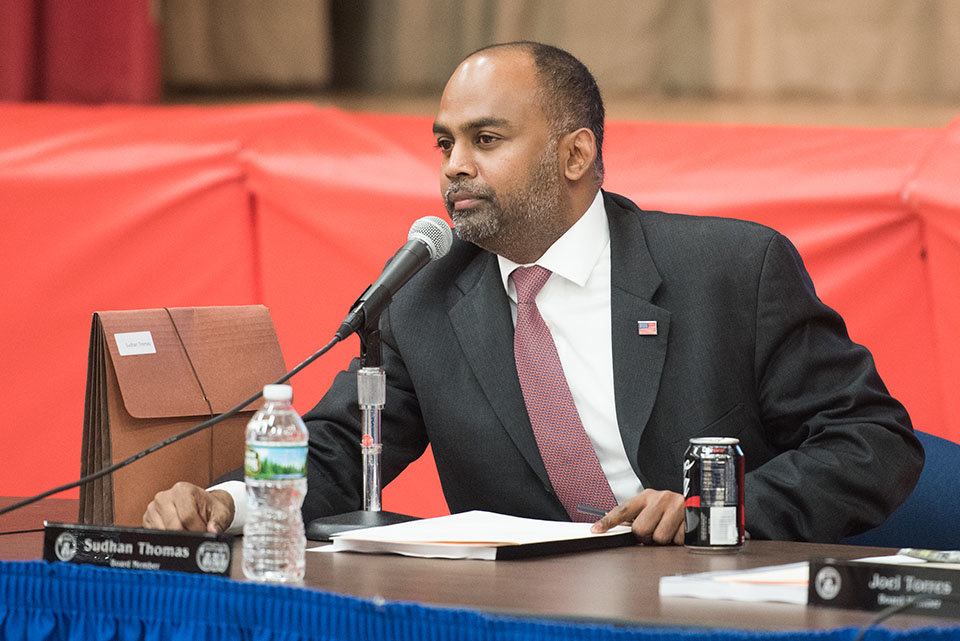I was a school board member for twelve years, including nine years as president. I thought I’d seen it all, including fraught negotiations with unions. I remember one particular negotiating session that commenced at 5 pm and concluded (successfully!) at 3:30 am the following morning. I ran home, got the house in order, packed lunches, got my kids ready for school, and was back in the Central Office by 8 am to sign a Memorandum of Understanding. But I didn’t realize how easy we had it until I started following the board shenanigans in Jersey City, New Jersey’s second largest school district, which educates 30,000 students, mostly poor and of color.
In fact, the Jersey City Board President Sudhan Thomas, along with six other board members, appears to function as an arm of the local teacher union, the Jersey City Education Association (JCEA), whose mothership NJEA supplied
the bulk of his campaign funding. (A slate of three candidates– Mussab Ali, Marilyn Roman and Joan Terrell-Paige — swept school board elections in November. They received $31,227 in campaign donations last year, $24,000 from the statewide teachers union and $2,500 from JCEA. A fourth board member is an NJEA member and a fifth is the relative of an NJEA member.)
Last night Matt Schapiro announced at the Jersey City school board public meeting that Thomas has met nine times — accompanied by one other board member, Lorenzo Richardson — with the JCEA negotiating team. Mr. Thomas is negotiating with the teachers’ union without informing the board and without board authority.
Why is this a problem? Oh, so many reasons. But let’s start with the School Board Code of Ethics
, which every board member must uphold. Among the assurances board members swear to uphold are these:
- I will recognize that authority rests with the board of education and will make no personal promises nor take any private action that may compromise the board.
- I will confine my board action to policy making, planning, and appraisal, and I will help to frame policies and plans only after the board has consulted those who will be affected by them.
- I will carry out my responsibility, not to administer the schools, but, together with my fellow board members, to see that they are well run.
- I will refuse to surrender my independent judgment to special interest or partisan political groups or to use the schools for personal gain or for the gain of friends.
Has Thomas violated these assurances? Let’s look at his alleged private actions, his determination to go way beyond policy-making, and his surrender of independent judgement to special interest groups.
What’s so bad about the board president meeting with JCEA without the authority of the board to hammer out a contract resolution? To answer this question, one must know how union negotiating works: the Board president appoints a committee of typically three board members and they work with the superintendent and the business administrator to produce a proposal (really a wish list) of changes they wish to make to the current contract and this proposal is reviewed by the full board. Most critically, the board as a whole directs the negotiating team on how high a raise they can offer, what concessions they’re prepared to make, and what their priorities are. After each negotiation session, which is conducted between the board team and the union team with administrators on hand for advisement, the chair of the negotiating committee updates the full board on progress or lack thereof in achieving resolution.
The board is on one side of the table. The union is on the other — literally.
Except in Jersey City.
One can glean insight from Sudhan Thomas’ ELEC filing for his school board campaign. NJEA’s PAC donated $8,200 to his campaign out of a total of $9,325 of campaign contributions. (See the bottom of this post for relevant copies of his filings with the New Jersey Election Law Enforcement Commission, or ELEC.)
That’s a lot of money for a board seat. Thomas paid himself $1,000. He paid a company called “Glocal,” which he claims to be CEO and President of, $4,500. His personal attorney Paul Appel got $3,100.
A google search for “Glocal” + “Sudhan Thomas” yielded zero hits. I’ve never heard of a aspiring board member giving him or herself a stipend for campaigning. But I don’t live in Jersey City.
Other oddities appear, some too arcane to explain in a blog post. But here’s a few tidbits. School boards are required to perform annual superintendent evaluations. The Jersey City school board has not done a performance review of Superintendent Marcia Lyles since 2014. No matter: the board fired her. Actually, it fired her six times
because Thomas kept getting the process wrong. (Lyles is suing the Board, Thomas, board member Marilyn Roman, the JCEA and its president, Ronald Greco. Here’s the lawsuit.)
Jersey City Public Schools regained local control this past October. As part of the process of regaining control, the DOE appointed Cathy Coyle as a monitor but then removed her. No one replaced her (which may have more to do with the DOE than Jersey City’s poor governance). With Lyles on administrative leave (at a salary of $231,000 per year) the assistant superintendent and the curriculum supervisor are running the district. Except they’re working without a contract because the board refused to renew them. The board also refused to renew the contracts of eight essential employees last summer despite the fact that Lyles recommended them for renewal. Of the eight, seven are people of color. Six have sued the district for $5 million each.
The students of Jersey City schools need a high-functioning board if they’re to have high-functioning schools. Right now they have neither. At William L Dickinson High School 88 percent of students failed to meet expectations in Algebra 1. At Whitney M Young Elementary School, four out of five third-graders can’t read at grade level
, an important benchmark for future academic success. Matt Schapiro, that lone honorable board member, is requesting an advisory opinion from the Ethics Board on whether or not Thomas and Richardson are conflicted from bargaining with the JCEA. He told me, “there’s no strategic plan, no road map. This district is driving with blindfolds on. It’s bad enough that the adults are set up for failure. What’s worse is that the children are too.”






4 Comments